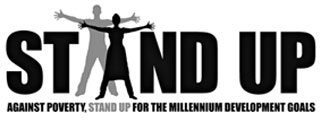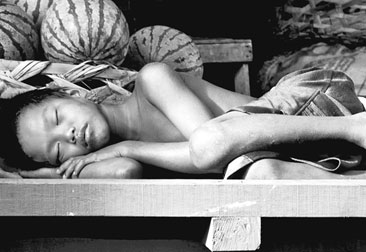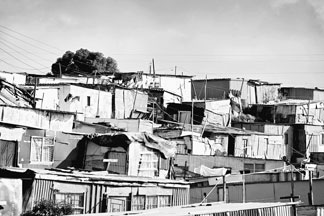|
Today is International Day for Eradication of Poverty
:
Poverty a thing of the past
By Pramod De SILVA
 Poverty. We see it every day, around us and in the wider world. It is
in the news all the time. Poverty as a phenomenon is a global one -
there are poor people even in the richest countries. But it is in the
developing world that poverty is most rampant. It would not be incorrect
to say that much of the world is poor. Poverty. We see it every day, around us and in the wider world. It is
in the news all the time. Poverty as a phenomenon is a global one -
there are poor people even in the richest countries. But it is in the
developing world that poverty is most rampant. It would not be incorrect
to say that much of the world is poor.
The United Nations defines poverty as a human rights violation.
Poverty or to be more precise, absolute poverty, is usually defined as
the lack of basic human needs, such as food, clean water, healthcare,
education, clothing and shelter, because of the inability to afford
them. Relative poverty is having fewer resources or less income than
others in society, compared to worldwide averages.
Every person has the right to a standard of living adequate for
health and well-being, to food, clothing, housing, medical care and
social services. These fundamental human rights are defined in the
Universal Declaration of Human Rights and other international human
rights treaties and declarations.
Adequate food
Statistics on poverty make grim reading. There are 1.6 billion people
who earn less than US$ 1.25 per day. More than 270 million people, most
of them women and children, have died as a result of poverty since 1990.
 One billion people globally lack access to adequate food (in other
words, one billion people live in hunger), 2.6 billion lack access to
improved sanitation, almost nine million children die before the age of
five and at least 340,000 women die every year from pregnancy-related
causes. One billion people globally lack access to adequate food (in other
words, one billion people live in hunger), 2.6 billion lack access to
improved sanitation, almost nine million children die before the age of
five and at least 340,000 women die every year from pregnancy-related
causes.
More than 884 million people worldwide still use unimproved water
sources. According to the World Health Organisation, hunger and
malnutrition caused by extreme poverty are the biggest threats to the
world's public health.
Lifting the world's poor out of the quagmire of poverty has become a
major challenge for the world community.
This is why every year, on October 17, the world is reminded of this
onerous task through the International Day for the Eradication of
Poverty.
It has been observed every year since 1993, when the General
Assembly, by Resolution 47/196, designated this day to promote awareness
of the need to eradicate poverty and destitution in all countries,
particularly in developing countries - a need that has become a
development priority.
The Poverty Eradication Day has a rather interesting history. It is
not decades- old unlike some of the other International Days, but is
nevertheless very significant. On October 17, 1987, around 100,000
people gathered on the Trocadero Plaza in Paris to honour victims of
hunger, violence, and ignorance, to express their objection to the
continuous existence of extreme poverty, and to call on mankind to unite
to ensure the respect of human rights.
On this day, a Commemorative Stone was inaugurated to bear witness to
the suffering and struggles of the poorest and to affirm that extreme
poverty is a violation of Human Rights. The stone, which has remained at
the centre of all subsequent commemorations of this day, was the idea of
Father Joseph Wresinski, founder of the International Movement Fourth
World. Since October 17 each year, the poor and those who reject extreme
poverty and exclusion gather throughout the world to express their
solidarity and their commitment to eliminating poverty everywhere.
The theme for this year's Poverty Eradication Day is "From Poverty to
Decent Work: Bridging the Gap". This is highly appropriate, since the
lack of proper employment often leads to poverty. By the same token, the
availability of decent work can help end poverty.
Decent work
The term 'decent work' is the key. All over the world, the poor are
exploited for labour, for wages that are often less than US$ 1 a day.
They are virtually slaves who toil for a pittance. At these nominal wage
levels, extricating themselves out of poverty is often out of the
question. The need is to find decent employment for the under-privileged
that will eventually help them emerge out of poverty.
 In fact, world leaders focused on these individuals at the recent
Millennium Goals Summit at the UN in New York. They again committed
themselves to cutting by half by 2015 the number of people living in
extreme poverty - people whose income is less than one dollar a day. The
biggest victory achieved at this landmark summit was the historic pledge
of US$ 40 billion from governments, private companies, and non-profit
organizations to improve child and maternity health across the globe.
Although this falls far short of a US$ 300 billion package earlier
sought by the UN, it is a good start. In fact, world leaders focused on these individuals at the recent
Millennium Goals Summit at the UN in New York. They again committed
themselves to cutting by half by 2015 the number of people living in
extreme poverty - people whose income is less than one dollar a day. The
biggest victory achieved at this landmark summit was the historic pledge
of US$ 40 billion from governments, private companies, and non-profit
organizations to improve child and maternity health across the globe.
Although this falls far short of a US$ 300 billion package earlier
sought by the UN, it is a good start.
Many countries including Sri Lanka have initiated successful programs
such as the Samurdhi Movement to help the poor, but a wider, global
response would be even better.
For example, the developed world can increase food and development
aid to the developing countries, which would make a dent in poverty
levels.
A fraction of their defence budgets would be adequate for this
purpose. In fact, under the Millennium Development Goals program, rich
countries are supposed to increase their foreign aid budgets to 0.7
percent of Gross Domestic Product. But so far only five countries have
reached that goal: Denmark, Norway, Sweden, the Netherlands and
Luxembourg, according to the U.N.
All the goals in the MDG program more or less centre on the theme of
poverty eradication. The goals are to: eradicate extreme poverty and
hunger, achieve universal primary education, promote gender equality,
reduce incidences of HIV and other diseases, curb climate change, get
developed countries to help poor countries to develop, improve maternal
health and reduce child mortality.
All these factors have a bearing on reducing poverty. It is
heartening to note that global poverty rates have declined a percentage
point since the inception of various MDG projects.
For example, under-five deaths have dropped to 8.1 million from 12.4
million in the past 15 years. That computes to 12,000 fewer children
dying a day, but it must be lowered by another 11,000 to meet the U.N.'s
MDG target. As for our region South Asia, extreme poverty in the region
fell from 41 percent in 1990 to 29 percent in 2004. That figure is still
higher than the 19 percent average for developing countries.
Most importantly, the number of people living on $1.25 a day or less
worldwide dropped to 1.4 billion from 1.8 billion between 1990 and 2005,
the U.N. says.
People living in extreme poverty, or under $1.25 a day, dropped from
46% to 27% in that time, and the decline was on target until the global
economic crisis emerged, forcing another 64 million people into extreme
poverty.
Financial recession
The latter has an adverse effect on poverty eradication efforts. The
global financial recession has depleted countries' resources and
restricted the ability to contribute to funding. Poorer countries were
hit very hard, derailing their anti-poverty plans. Although the worst of
the crisis is now over, the lingering effects remain.
 But Governments alone cannot wipe out poverty. Non-Governmental
Organisations, the private sector and even individuals can contribute to
reducing poverty. Change for the better does begin on the individual
level. If we all contribute to a charity to lelp the poor, there will be
a discernible effect. As an analyst remarked after the MDG Summit, "the
multiplying effect of individual efforts is undeniable and
unparalleled". The poor themselves have a role to play - by getting
involved in programs designed to make them self-reliant instead of
always looking for Government assistance. But Governments alone cannot wipe out poverty. Non-Governmental
Organisations, the private sector and even individuals can contribute to
reducing poverty. Change for the better does begin on the individual
level. If we all contribute to a charity to lelp the poor, there will be
a discernible effect. As an analyst remarked after the MDG Summit, "the
multiplying effect of individual efforts is undeniable and
unparalleled". The poor themselves have a role to play - by getting
involved in programs designed to make them self-reliant instead of
always looking for Government assistance.
There are many microfinance options that assist even the poorest of
the poor to overcome their predicament.
As UN Secretary-General Ban-Ki Moon noted, "We must not fail the
billions who look to the international community to fulfill the promise
of the Millennium Declaration for a better world." It is this vision,
this goal that the world should aspire to achieve in the years ahead.
The world should be determined to make poverty history. |

